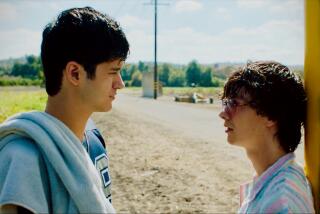Tests of Manhood Won With a Little Help From Friends
- Share via
Elliott and Win by Carolyn Meyer (Atheneum: $11.95 hardcover)
Standing atop a mesa in New Mexico, 14-year-old Win Kelly surveys the ruins of an ancient Indian settlement. “Must have been hard being an Indian,” he thinks, “but at least you knew what you were supposed to be, what you were expected to do . . . your manhood was tested in various ways.” Then, ruefully, “I probably couldn’t have passed the test.”
“Elliott and Win” is the story of an unusual friendship and of an engaging boy who sorts out the puzzles of adolescence, struggling to pass that test. For Win, knowing what he is supposed to be and do is not easy. He has little in his life to guide him.
Following the departure of her latest husband, Win’s mother, who has a talent for marrying drifters, moves her small family to Santa Fe to put together a new life. New in town, lonely and confused, Win daydreams about being reunited with his long-absent father. His mother, sensing that Win needs a man’s influence, signs him up with Los Amigos, an organization that provides adult male friends for fatherless boys, and Elliott Deerfield enters Win’s life.
A Mismatched Pair
Elliott and Win are an unlikely pair. Elliott is a confirmed bachelor in his late 50s who collects sculpture, loves opera, wildflowers and gourmet cooking. Win prefers burgers and TV. Their initial encounters are funny and touching. Elliott is determined to teach Win to eat gazpacho, use proper grammar and let Mozart’s music “soak into his bones.” Win is almost equally determined to resist. Why, he wonders, couldn’t he have found an amigo like his friend, Paul’s--someone who likes enchiladas and horror films?
Paul has his own ideas about Elliott. “Likes opera? . . . Likes to cook? Big sport is jumping rope? What do you think a confirmed bachelor is, anyway?” Paul’s conviction that Elliott is gay makes Win uneasy, half-confirming his doubts about Elliott, stirring subtle questions about his own sexual identity.
Despite Paul’s taunts, Win’s friendship with Elliott grows. Together they photograph wildflowers, bake bread, attend a performance of “The Magic Flute.” They discover a shared ambition to be writers. For Win, worries about sexual orientation begin to fade away.
By the time Heather Key appears in his life, Win is doing some gourmet cooking himself, reading novels and writing a little as well. Win and Heather become friends, exchange confidences, and their affection for one another grows. Then one terrible evening everything is shattered. While Win watches, Heather is viciously attacked. He is powerless to protect her.
Confidence Evaporates
In the wake of this experience, Win’s new-found confidence in his masculinity evaporates. He feels that he has failed a test. It is Elliott who helps Win face down his sense of failure and find the courage to continue growing.
“Elliott and Win” is a wise book. Sane and sensitive, it has a good deal to say about contemporary life and its confusions. It has a lot to say about the bewilderment of the young. Numbers of vividly drawn characters range its pages. The atmosphere of the Southwest is lovingly evoked. But it is the slowly evolving friendship between man and boy that makes this a memorable novel.
To Meyer’s great credit, the novel, which begins with a boy’s questions about what it means to be a man, moves steadily toward a much broader question. This is, finally, a book that explores what it means to be a human being.
Among those of us who complain sometimes that there isn’t enough good young adult fiction being written about adolescent boys, Meyer’s perceptive novel should find an enthusiastic welcome.
More to Read
Sign up for our Book Club newsletter
Get the latest news, events and more from the Los Angeles Times Book Club, and help us get L.A. reading and talking.
You may occasionally receive promotional content from the Los Angeles Times.









